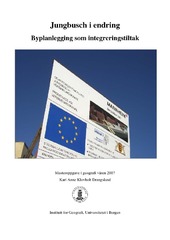Jungbusch i endring. Byplanlegging som integreringstiltak
Master thesis
Permanent lenke
https://hdl.handle.net/1956/2372Utgivelsesdato
2007Metadata
Vis full innførselSamlinger
- Department of Geography [630]
Sammendrag
In Norwegian and West-European urban planning, the tendency can be observed that urban social planning increasingly is seen, and used, as an instrument of social integration measures. This paper examines what happens when the discourse of social integration is embedded in an urban planning discourse, and integration measures take the form of spatial organisation at the neighbourhood level. My empirical outset is the urban development process in the neighbourhood of Jungbusch in Mannheim, Germany. This development has two main goals; on the one hand its aim is to improve the living conditions and social integration in the neighbourhood. On the other hand the city of Mannheim wants to make the area attractive to the “creative economy”. To examine this process I employ a Lefebvrian approach to planning. I explore what discourses are hidden under the heading of “social planning”, when it is articulated as aiming at social integration. The urban development of Jungbusch can be seen as a process of “planning diversity”. The paper also researches the limits to this planned multicultural diversity and asks: to what extent is this planned diversity in Jungbusch a “commodification of diversity” or a “politics of difference”?
Utgiver
The University of BergenOpphavsrett
The authorCopyright the author. All rights reserved
